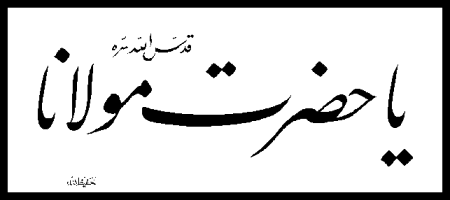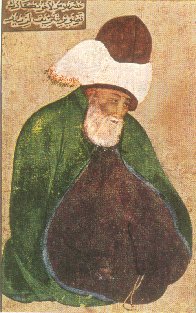 |
 |
 |
Rumi Seminar Colgate University Fall 2001 Omid Safi |
Course Rationale:
The focus of this advanced-level seminar is on the 13th century Persian mystic and poet, Jalal al-Din Rumi, revered from Iran to India, Turkey to America. 700 years after his death, Rumi has become the best selling poet in America. There aim of the class is to contextualize this highly influential religious figure in his own intellectual, literary, and institutional context.
There will be extensive analysis of Rumi's poetry, widely considered among the finest mystical poetry ever produced. We will also trace the successive constructions of Rumi, ranging from a Persian poet to a Turkish saint, and most recently, an American spiritual pop-icon.
Prerequisite:The class is open to all, and would be particularly of interest to those who have done previous work in the Islamic tradition or have a strong background in literature.
Texts Required:
It is a great challenge to assign texts for a study of Rumi. In traditional circles where Rumi's teachings has been studied, a more conventional method has been to take a short number of poems, and study them extensively: often for years! One story states that the first 18 lines of the Masnavi have to be studied for 40 years....
Having a bit more time restriction on the present seminar, I have tried to find a mixture of books for this course. They range from those written by the foremost scholarly authorities on Rumi (Frank Lewis, William Chittick, and Annemarie Schimmel) to composers of popular "translations"/versions (Coleman Barks, Kabir Helminski, Andrew Harvey) to people whose life has simply and profoundly been transformed by Rumi's spiritual teachings (Shams Friedlander, Shakina Reinhertz). We will spend a good bit of time critiquing many of the popular "versions" of Rumi.
Naturally our task is to read as much of the primary sources as possible. Sadly, the complete translation of Rumi's Masnavi is far too expensive to be assigned in toto. Therefore, we will use some of the popular "versions", while remaining critical of their tendency to de-emphasize the Sufi and Islamic context of Rumi's poetry. In addition, I will translate many previously unavaible texts from the Manaqib al-'arifin (Rumi's main biography) for you, and we will analyze them in class.
1) Franklin Lewis, Rumi:
Past and Present, East and West
This text is widely considered the best, most thorough, and
most accurate book on Rumi.
Let this be your guide and constant point of reference throughout
the whole semester.
2) William Chittick, The Sufi Path of Love: The Spiritual
Teachings of Rumi
3) Annemarie Schimmel, The Triumphal Sun
4) Rumi's Fihi ma fihi, translated as Signs of the
Unseen: The Discourses of Jalaluddin Rumi
5) Kabir Helminski, The Rumi Collection (Shambhala)
6) Andrew Harvey, Teachings of Rumi
7) Coleman Barks, The Essential Rumi
8) Shakina Reinhertz, Women Called to the Path of Rumi: The
Way of the Whriling Dervish ((Hohm Press)
9) Shams Friedlander, Rumi: The Hidden Treasure (Fons
Vitae)
In addition, there will be many articles as part of the coursepak, which the students will be asked to purchase in class. The coursepack will contain the following:
Coursepack#1: A.J. Arberry, translations of Baha Valad's
Ma'arif, cited in Aspects of Islamic Civlization, pages
227-255.
Coursepack#2: William Chittick, discussion of teachings of Baha
Valad, cited in Sufism: A Short Introduction, pages
97-110.
Coursepack#3: Fatemeh Keshavarz, Reading Mystical Lyric: The
Case of Jalal Al-Din Rumi, 1-48.
Coursepack#4:
Course expectations:
Let me be as clear as I can about this. There is little denying the fact that Rumi's poetry and spiritual teachings are extremely appealing. Millions of people all over the world, and hundreds of thousands in North America are turning to Rumi's poetry and teachings for inspirations.
While in this class we are concerned with the phenomenon of this inspiration, this is not meant to be a class for those who are only seeking to be inspired. This course is offered at the highest academic level at Colgate University: a senior seminar. My intention is to approximate a graduate level course as closely as possible here. The work load is intense: over 100 pages of reading per class, with daily writing assignments. In each and every class period, I will expect you to participate fully in class discussions. Without the reading, writing, and class discussions, one stands little hope of doing well here.
Click here to go to the syllabus
Click here to go back to Omid Safi's main page.